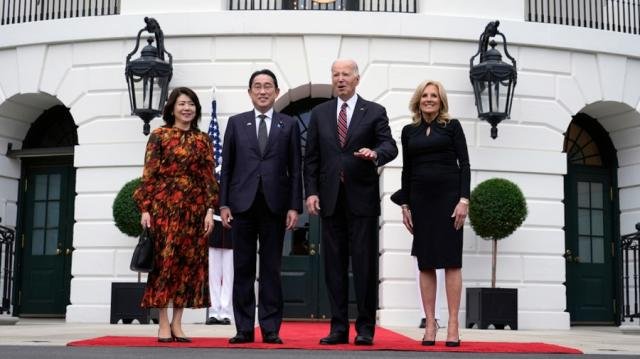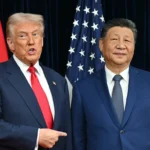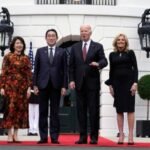Table of Contents
ToggleA Strategic Alliance
As the world navigates through a complex web of geopolitical tensions, the recent state visit between President Joe Biden and Japanese Prime Minister Yoshihide Suga carries profound significance. Against the backdrop of an increasingly assertive China, the meeting between the leaders of two of the most powerful democracies sends a clear message: a united front against any challenge to the rules-based international order.
The alliance between the United States and Japan has long been a cornerstone of stability in the Indo-Pacific region. Rooted in shared values of democracy, human rights, and the rule of law, this partnership has played a pivotal role in shaping regional dynamics. With China’s rapid ascent on the global stage, the strategic alignment between Washington and Tokyo becomes even more crucial in ensuring peace and stability.
Bolstering Security Cooperation: Strengthening Defense Ties
During the state visit, both leaders reaffirmed their commitment to deepening security cooperation, underscoring the importance of a robust military alliance in deterring any potential aggression. In the face of China’s growing military capabilities and assertive behavior in the South China Sea, this renewed focus on defense collaboration sends a strong message of deterrence.
One key aspect of this collaboration is the continued presence of U.S. forces in Japan, which serves as a bulwark against regional threats. Additionally, discussions on enhancing joint military exercises and intelligence-sharing mechanisms further underscore the shared commitment to ensuring regional security. By bolstering defense ties, President Biden and Prime Minister Suga are signaling their readiness to confront any challenges to the established order.
Economic Resilience: Fostering Trade and Investment
Beyond security concerns, the state visit also emphasized the importance of economic resilience in countering China’s influence. Both leaders recognized the need to strengthen trade and investment ties as a means of bolstering their respective economies and reducing dependency on Chinese markets.
The Biden administration’s emphasis on revitalizing domestic manufacturing and investing in critical industries aligns with Japan’s own efforts to diversify its supply chains and reduce reliance on Chinese imports. Discussions on enhancing bilateral trade agreements and fostering innovation underscore a shared commitment to economic prosperity and resilience in the face of external pressures.
Promoting Democratic Values: Championing Human Rights and Democracy
At the heart of the U.S.-Japan alliance lies a shared commitment to upholding democratic values and human rights. As China continues to face scrutiny for its human rights abuses and authoritarian practices, President Biden and Prime Minister Suga reiterated their unwavering support for democratic principles.
The state visit provided an opportunity for both leaders to condemn China’s crackdown on civil liberties in Hong Kong, its treatment of Uighur Muslims in Xinjiang, and its aggressive actions towards Taiwan. By standing firm on issues of human rights and democracy, President Biden and Prime Minister Suga reaffirmed their commitment to promoting a free and open Indo-Pacific region.
Addressing Climate Change: Collaborating on Environmental Sustainability
Amidst the pressing challenges of climate change, the state visit also highlighted the importance of international cooperation in addressing environmental sustainability. Both President Biden and Prime Minister Suga reiterated their commitment to combating climate change through ambitious targets and clean energy initiatives.
Discussions on technology transfer, renewable energy investment, and climate resilience underscored a shared commitment to environmental stewardship. By aligning their efforts to tackle climate change, the United States and Japan are not only addressing a global challenge but also sending a message of unity and resolve in the face of shared threats.
Countering Chinese Aggression: Asserting Maritime Security
One of the focal points of the discussions during the state visit was the importance of maritime security in the Indo-Pacific region. With China’s growing assertiveness in the South China Sea and East China Sea, both leaders emphasized the need to uphold freedom of navigation and ensure the rule of law.
By reaffirming their commitment to the U.S.-Japan Security Treaty and joint maritime exercises, President Biden and Prime Minister Suga sent a clear message to Beijing: any attempts to challenge the status quo will be met with a unified response. This emphasis on maritime security underscores the shared resolve to counter Chinese aggression and preserve regional stability.
Cultural Diplomacy: Strengthening People-to-People Ties
In addition to strategic and economic cooperation, the state visit also highlighted the importance of cultural diplomacy in fostering mutual understanding and friendship between the peoples of the United States and Japan. Both leaders emphasized the significance of educational exchanges, cultural programs, and youth engagement initiatives in deepening bilateral ties.

Through initiatives such as the Japan Exchange and Teaching Program (JET) and the Fulbright Program, the United States and Japan continue to strengthen people-to-people connections and promote cross-cultural understanding. By investing in cultural diplomacy, President Biden and Prime Minister Suga are laying the foundation for enduring partnerships based on mutual respect and shared values.
Looking Ahead: A Shared Vision for the Future
As President Biden and Prime Minister Suga concluded their state visit, the message to China was unmistakable: the United States and Japan stand united in defending the principles of freedom, democracy, and the rule of law. From bolstering security cooperation to fostering economic resilience, their discussions encompassed a wide range of issues critical to regional stability.
Moving forward, the strategic alliance between the United States and Japan will continue to serve as a linchpin of stability in the Indo-Pacific region. By working together to address common challenges and uphold shared values, President Biden and Prime Minister Suga are laying the groundwork for a future defined by peace, prosperity, and cooperation.
In a rapidly evolving geopolitical landscape, the state visit between President Biden and Prime Minister Suga serves as a beacon of hope for a world grappling with uncertainty. As the United States and Japan reaffirm their commitment to a free and open Indo-Pacific, the message to China is clear: any attempts to undermine the rules-based international order will be met with steadfast resolve. Through strategic cooperation, economic partnership, and a shared commitment to democratic values, President Biden and Prime Minister Suga are forging a path towards a future defined by stability and cooperation.








